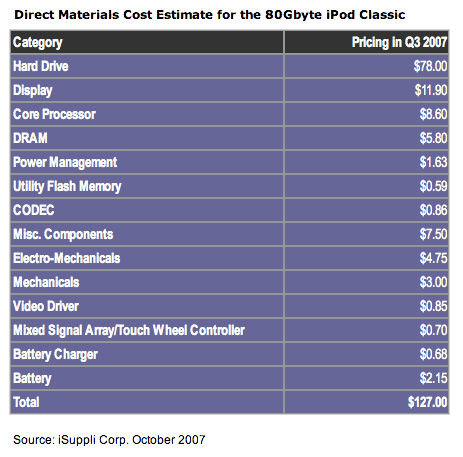Echoing sentiments first outlined in AppleInsider's review of the iPod Classic, the market intelligence firm believes the player's days may be numbered, as sales of the Classic are expected to begin their slow and inevitable decline beginning sometime next year.
"Apple’s continuation of the iPod model without adding new features suggests a stopgap measure necessitated by lack of time to develop an HDD-based touch iPod," said consumer electronics Chris Crotty.
Still, the Cupertino-based firm has seemingly managed to squeeze additional gross margin from the new Classic line when compared to last year's offerings, despite its uncharacteristic backward-looking approach to the player.
The new iPod classic carries a Bill of Materials (BOM) of $127 for the 80Gbyte version, and about $190 for the 160Gbyte model, according to iSuppli’s teardown of the players. This includes estimated costs of $78 for the 80Gbyte HDD in the low-end classic and $140 for the 160Gbyte HDD in the high-end model. That means the new 80Gbyte model sports a BOM that is 11.2 percent lower than that of the company's 30Gbyte model ($143) released last year.
However, the Classic’s dated features suggest stopgap measures that are likely to limit the product’s longevity and success in the market, iSuppli believes. The firm tentatively forecasts that iPod Classic shipments will start with a bang this holiday, rising to about 3.1 million units in 2007. However, growth will likely slow markedly after that, with shipments rising by only 12.9 percent to reach 3.5 million in 2008.
In contrast, combined shipments of the new NAND flash memory-based iPod nano and touch models are expected to amount to 26 million units in 2007, rising to nearly 40 million units in 2008 — a 52 percent increase. iSuppli believes Apple will continue to take advantage of the 50 to 60 percent annual reductions in flash memory pricing to maintain or decrease its production costs, while doubling its players’ storage capacity every year with the solid-state storage technology as the HDD iPod slowly fades into the distance.
 Slash Lane
Slash Lane







-m.jpg)






 Marko Zivkovic
Marko Zivkovic
 Malcolm Owen
Malcolm Owen


 William Gallagher
William Gallagher
 Amber Neely
Amber Neely
 Sponsored Content
Sponsored Content


-m.jpg)






82 Comments
I've been buying CD's for about a zillion years now and have amassed an enormous collection of relatively useless plastic. With the 160 GB iPod Classic I have been able to move almost all of that library onto a cigarette pack-sized device and clear my shelves of what is clearly a media anachronism.
My Point: Until Apple can deliver a flash drive device with THAT kind of storage capacity--at an affordable cost--I'll keep my Classic, OK?
As an owner of a 160gb, I don't know why they want to kill it off. I love having 160gb. FINALLY an iPod that can store enough video and music to where i CAN SYNC when I want to. Unless they can break 100gb with Flash, I don't see why the hd based players would be replaced. MAYBE they can break 100gb in a year, but I doubt it. Not because of technology but because of costs. We'll see.
I don't think you guys are reporting this quote right at all. It doesn't say anything about getting rid of HDD based iPods, rather it refers to the fact that they didn't have enough time to roll the Touch interface into the HDD form factor.
Don't think for a second that high volume storage is going anywhere. Apple has every intention of pushing storage levels that drive video, lossless audio, and high count music libraries.
Flash devices also do have a limited number of times data can be written to it, that limit is far less than hard disks, I'm all for having the option, there is no reason they can't develop both.
I don't think you guys are reporting this quote right at all. It doesn't say anything about getting rid of HDD based iPods, rather it refers to the fact that they didn't have enough time to roll the Touch interface into the HDD form factor.
Read it again, it totally does.
"signals the beginning of the end for hard disk drive (HDD)-based iPods"
"the media player line may be the last from Apple to employ the venerable HDD technology for storage"
This doesn't surprise me at all, I've been saying all along that the Classic is just a stopgap product intended to keep an increasingly smaller group happy until they finally switch entirely to flash based models.
Flash devices also do have a limited number of times data can be written to it, that limit is far less than hard disks
Do you have a source on that? Looking online, it looks like flash devices have a limit, but it seems extremely high, with normal use much higher than the average person would be able to wear it out. With no moving parts, even with that limit, it still seems like it would be much more reliable than a HD based unit.